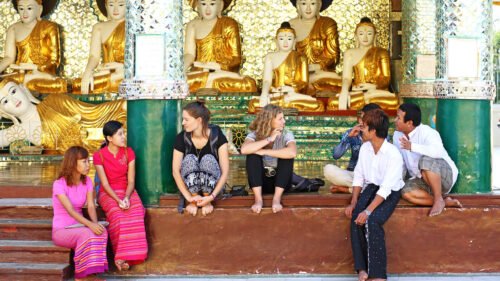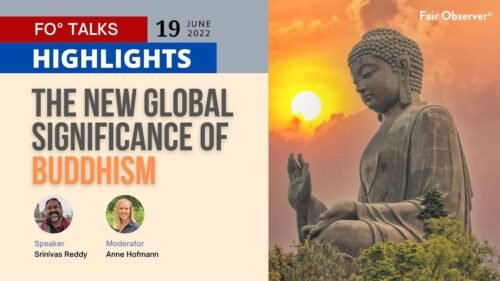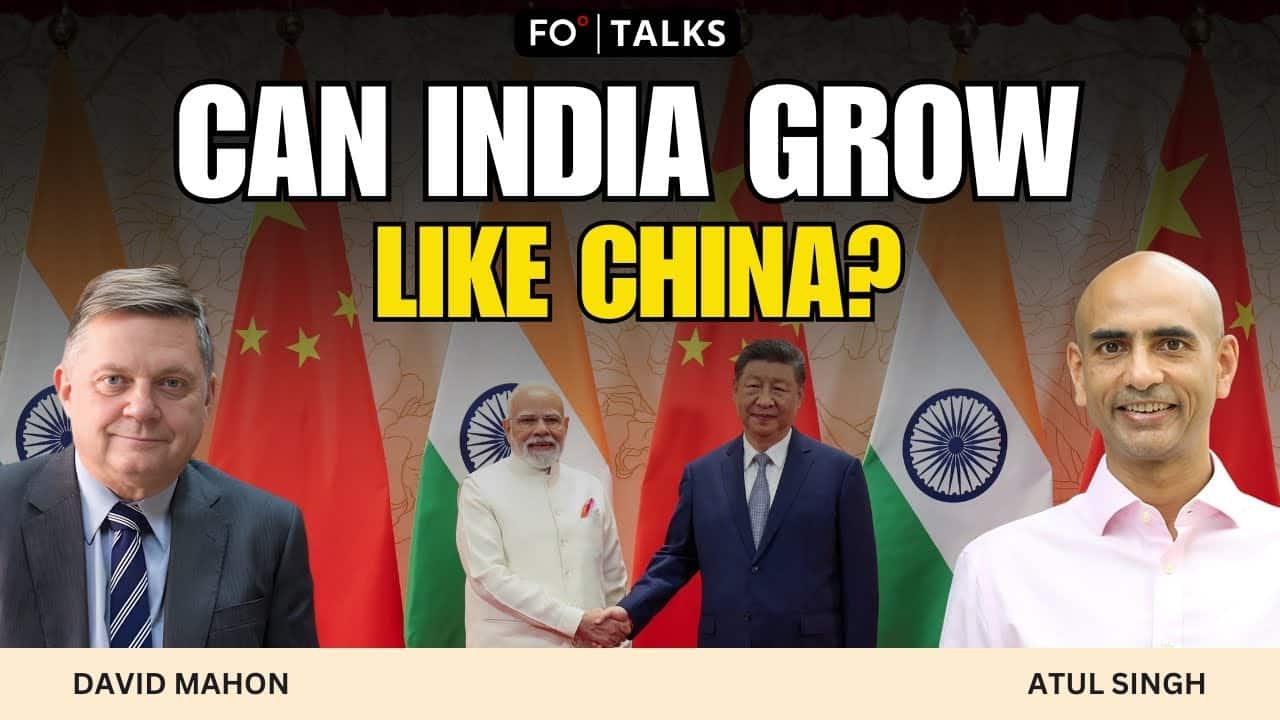In this episode of FO° Talks, Fair Observer Contributing Editor Anton Schauble and clinical psychologist and meditation teacher Tucker Peck discuss his approach to Buddhism and his book, Sanity and Sainthood. Peck presents a balanced path between traditional Buddhism and its American offshoots, seeking a grounded, ethics-focused practice rooted in the Pāḷi Canon — the collection of scriptures in the Theravada Buddhist tradition — rather than vague contemporary interpretations. He describes his work as walking a “middle road” — eschewing both rigid metaphysics and watered-down spiritual clichés in favor of an engaged, scripture-informed inquiry.
Studying the oldest texts to teach clearly
Peck began teaching meditation at the age of 29 and quickly realized the importance of anchoring his instruction in canonical texts rather than personal spiritual experiences. He emphasizes the richness and complexity of the Pali Canon, the earliest collection of Buddhist scriptures. Though difficult for newcomers to read due to its length and lack of editing, Peck insists it holds invaluable insights when properly interpreted.
Core Buddhist teachings in a modern context
Peck frames the Buddha as one of history’s intellectual giants. At the heart of the Buddha’s awakening are the Four Noble Truths — particularly the insight that suffering arises from the futile desire to control the uncontrollable. Another essential teaching is dependent origination (Patiṭṭha-samuppāda), which outlines the twelve interlinked processes through which distorted perception fuels stress. Later interpretations, aligned with systems theory, see causality as web-like rather than linear: Everything affects everything else.
Peck also explores the three marks of existence:
- Impermanence (Anicca): Everything is in flux, even if it appears stable.
- Non-self (Anatta): There is no fixed self — everything we identify with, including our own body and consciousness, is merely an object of awareness.
- Dissatisfaction (Dukkha): Clinging to impermanent things for lasting happiness is inherently stressful and misguided.
According to Peck, these three insights reject the metaphysical, psychological and ethical absolutes many traditions depend on. The Buddha, he argues, didn’t aim to create a religion or define a heavenly realm. Early Theravada Buddhism reflects this restraint. However, later Buddhist traditions sometimes ascribe divine qualities to realization, speaking of a “great mind” or “bodhicitta” imbued with wisdom that acts through the practitioner.
Sanity and Sainthood: two goals of practice
Peck’s book title captures what he sees as the twin aims of Buddhist practice:
- Sanity means responding appropriately to reality — not projecting past traumas or imagined fears. Many people, Peck says, are deeply disconnected from their actual experience, leading to unhappiness despite outward success.
- Sainthood reflects the aspiration to be a good person. Here, the enemy is not moral weakness, but the invisible inner forces that drive behavior. Meditation helps reveal these hidden influences — what Peck calls “internal dark money” — so they no longer unconsciously control one’s actions.
The Eightfold Path: a framework for transformation
Peck presents the Eightfold Path as a practical framework, grouped into three categories:
- Intellectual/educational: Right View and Right Aim focus on learning from seasoned practitioners and adopting a worldview that emphasizes cause and effect, and the harm of greed and separation.
- Ethical conduct: Right Speech, Action and Livelihood all revolve around reducing harm and avoiding activities that cloud the mind — from drugs and alcohol to digital distractions.
- Meditation: Right Effort, Mindfulness and Concentration aim to cultivate awareness and insight, especially through the Vipassana meditation technique, which deconstructs perception and experience.
The power and perils of meditation
Peck draws a distinction between casual meditation and intensive retreat practice. A few minutes a day is helpful for everyone, promoting calm and self-awareness. But after 25–40 minutes, meditation shifts into “exposure therapy,” where suppressed thoughts and emotions surface. This can lead to destabilizing experiences, especially for people with recent trauma or unresolved mental health issues.
Some rare but serious side effects include:
- Feeling physical sensations as energy rather than a solid body, disrupting sleep
- Surfacing of psychological content one isn’t prepared for
- Perceptual disturbances from deconstructing sensory systems
Peck warns that intensive practice isn’t for everyone. For some, losing the conventional sense of self can be liberating; for others, it’s disorienting. The key, he says, is the ability to voluntarily return to one’s everyday identity — for example, “Tucker” or “Anton” — when engaging with society.
A personal turn toward Buddhism
Raised Jewish, Peck explored several religious paths before choosing Buddhism. He found Judaism and other traditions either ethically outdated or lacking clear, replicable spiritual practices. Buddhism appealed to him because of its sparse metaphysical demands and its step-by-step guidance for achieving awakening.
Despite textual contradictions, Buddhism struck him as remarkably progressive for ancient India, offering examples of racial and gender equality. He cites a sutta (Buddhist sermon) where the Buddha’s disciple Ananda accepts water from a woman of low caste, rejecting caste hierarchy with the phrase, “I asked you for water, not for caste.” For Peck, viewing all humans as equal is an ethical necessity rooted in the Buddhist principle of non-self.
Why tech workers are drawn to Buddhist practice
Peck notes that a large number of his meditation students are from Silicon Valley. He speculates that people in the tech industry, who often have material security, eventually recognize that their problems are internal. Without external scapegoats for their unhappiness, they turn to spiritual solutions. Buddhism, with its logic-friendly metaphysics and perceived scientific validation, offers a system for mental transformation that appeals to this demographic.
Kalamasutta and the Buddhist epistemic approach
Peck closes by referencing the Kālāma Sutta, which lays out a Buddhist hierarchy of knowledge:
- Lowest: scripture or tradition
- Middle: logical reasoning
- Highest: direct, personal experience
He encourages viewers to experiment with meditation for even five minutes, noting that it can immediately reveal the mind’s patterns. A simple practice he suggests is identifying something one is trying to control that can’t be controlled, and then letting it go, observing the resulting feeling of relief. This kind of empirical, experience-based insight, Peck says, lies at the heart of Buddhist wisdom.
[Tucker Peck’s book, Sanity and Sainthood, is available on Amazon.]
[Lee Thompson-Kolar edited this piece.]
The views expressed in this article/video are the author’s own and do not necessarily reflect Fair Observer’s editorial policy.












































Comment